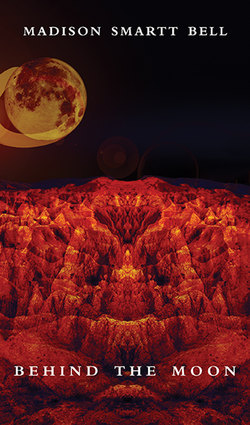Читать книгу Behind the Moon - Madison Smartt Bell - Страница 40
На сайте Литреса книга снята с продажи.
32
ОглавлениеPeggy Keenan flipped the top of a box of Winston Lights and shoved it across the mesh table toward her. Marissa shook her head, pushed the pack away, watched Peggy draw a pale cigarette from the box, strike fire from a pink butane lighter. She took a sip of the tasteless coffee from the office machine, whose only value was to wash down cigarettes, and with her other hand she slipped the beads in the pocket of her white lab coat along their string. Not that Peg’s cigarettes really tempted her. Marissa smoked—used to—real tobacco: Marlboro Reds, or Luckies when they could be found, the short Camel straights, something that would turn even her fingers brown, let alone her lungs. She hadn’t quit for health reasons. It was a mortification, and she felt it that way; the stale weak smoke from Peg’s exhale, blowing across her face in the autumn wind, was just a nasty smell, but enough to fire her craving.
Peggy arched a plucked crescent of eyebrow. “How long’s it been?”
Marissa worried a bead on her hidden rosary. “Six days,” she said.
“Five hours,” said Peg. “Forty-three seconds.”
Both women laughed briefly. Peggy tipped her ash onto the pavement—the same hexagon-scored concrete she’d seen spooled out by U.N. nation-building efforts all over the Third World. The wind skirled the cylinder of ash toward the narrow end of the trapezoidal courtyard, where a row of waiting clients smoked in the windbreak of the retaining wall and drank from containers hidden in paper sacks. It was just early autumn, but the breezes had a bite.
“Seriously now,” Peg said. “You’re halfway home. Or better. First day’s the worst, just pure hell. Then the first week’s bad. Then after that—” She took a drag and blew it out over the head of her cigarette, held vertically before her face, “—it never gets any better!”
Marissa looked at her, then away, toward the narrow end of the courtyard. In the space between them and their clientele, pigeons hunted crumbs through a windblown litter of snack wraps.
“What?” said Peggy, stepping on her butt with the fat soft toe of her fleecy boot. “You think I don’t know how to quit? I do it all the time!”
Marissa smiled thinly at the old gag, watching a pigeon peck its way closer to her own sneakered feet. She’d counted her way to the rosary’s cross. Claude had bought it from somebody on the rez, he’d told her, but it was finer than the usual tourist trinket, the beads satiny and sleek, the crucifix made of two different woods: light cross and a black Christ.
“We used to club those things by the thousands,” Peggy said, looking down at the same pigeon. “Back when they were thicker than snow.” She made a fake retching sound. “Lord, I wouldn’t eat one now if you paid me.”
We who? Marissa wondered briefly. Peg’s name and her pleasures were strictly Irish, her hair dirty blond and her eyes an impish green. Marissa had once blundered on her personnel file, where the statement that Peg was one-quarter Oglala Sioux had struck her at first as some kind of mistake. Later she took a closer look at Peg’s cheekbones and the way she walked, and decided after all there might be something in it. Something that could make Peg’s regular slurs on their clients a sort of speech within the tribe.
“Those were passenger pigeons,” Marissa said, considering that whites had probably hammered more of them to death than the Indians ever did. “Not the same thing, I don’t think. Who knows, they might have been tasty.”
Peggy snorted, stood up and kicked at the pigeon, which responded with a form of technical compliance, fluttering about a yard away from Peggy’s boot. Then the wind hooked down in a spiraling whoosh and lifted the trash and the pigeons all at once. Marissa followed the path of their flight to the thin end of the courtyard. The south wall of the building had two entries, one for Indian Health Services and the other for the counseling service that employed her and Peg. These were two ostensibly separate entities, but as Peg liked to quip, they did a lot of screwing around in the back alley. Looking at the huddle of clients waiting by the wall, Marissa felt a pang that was more than just wanting a smoke. She hadn’t realized Inez was there until the girl flipped back the fake-fur-lined hood of her stained parka. Inez was beautiful, so much so that she’d been a poster girl for the college she dropped in and out of. A métisse, more obviously Lakota than Peg, with long sleek hair and a sweet band of freckles over the bridge of her nose. Her belly was just slightly rounded with what Marissa suspected to be an early pregnancy.
Inez didn’t seem to notice her sitting at the table with Peg. She blew a smoke ring, smiled and sipped from a paper sack the man beside her offered. The sacks held cans of malt liquor, most likely, or the more recent ready-made canned cocktails, designed for children and street alcoholics. Most of their clients came in for court-ordered drug or alcohol counseling, and most of their payments were winkled somehow out of IHS. They did a little family counseling, and now and then there was a client like Inez who proffered an image of something that faintly resembled hope.
Peg stood with her knuckles resting on the flaking white paint of the mesh tabletop, looking toward the other end of the courtyard. “My people,” she said, with her usual fine blend of sorrow and contempt. “Well, you wanna go in?”
